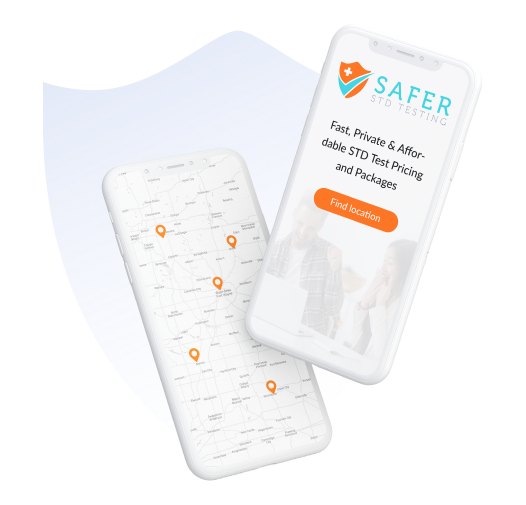

Our testing process is fast, simple, and discreet:
No waiting rooms, no paperwork, just fast results and peace of mind.
If you’re unsure which STD test you need, the 10-test panel is a comprehensive option that screens for the most common infections, including chlamydia, gonorrhea, HIV type 1 and 2, syphilis, hepatitis A, B, and C, and herpes simplex virus types 1 and 2.
The Centers for Disease Control and Prevention (CDC) recommends routine screening for common STDs like chlamydia, gonorrhea, syphilis, hepatitis B, hepatitis C, and HIV for both men and women, depending on risk factors. Women, especially those with multiple partners, are also encouraged to get tested for trichomoniasis, while men who have sex with men (MSM) may need more frequent testing. Although herpes (HSV-1 and HSV-2) testing isn’t routinely recommended for people without symptoms, it may be considered for those at higher risk. The 10-test panel aligns closely with these guidelines, offering a convenient and proactive way to protect your health.
If you’re sexually active, have a new or multiple partners, have had unprotected sex, are experiencing any symptoms such as unusual discharge, sores, or burning during urination, or have never been tested before, get tested today.
According to the World Health Organization, more than one million sexually transmitted infections are acquired every day, and the majority show no symptoms. This makes routine testing even more important, even if you feel fine.
To be safe, you should get tested again in 90 days to account for STD incubation periods, especially for infections like HIV that may not show up immediately after exposure. To test for HIV between 9-11 days after suspected exposure, you can use HIV RNA Early Detection test.
Regular testing is one of the most important steps you can take to protect your health and the health of your partners.
Most test results are available within 1 to 2 business days. You will receive them securely online, and support is available if you have questions about next steps.
Your results will be delivered securely through a confidential online portal within 1 to 2 business days after your lab visit. You’ll receive an email or text notification as soon as your results are ready to view.
All results are HIPAA-compliant and password-protected, ensuring your information stays private. No results are ever sent to your home, added to your permanent medical record, or shared with your insurance provider unless you choose to disclose them.


Call our Expert Care Advisors at



If a test result is positive, you will have access to a licensed medical professional who can provide a private consultation, explain your results, order your prescription (as needed) and guide you through the next steps. With fast turnaround times, discreet collection, and strict privacy standards, you can feel confident knowing your health information and samples are in safe hands.
Yes, it is recommended to get tested even if you are symptom-free. Many sexually transmitted infections are asymptomatic, meaning they show no signs or symptoms at all, yet they can still be passed to partners and cause long-term health issues if left untreated.
Infections like chlamydia, gonorrhea, HIV, and herpes often go unnoticed without routine testing. That’s why health organizations like the CDC recommend regular screening, even if you feel completely fine.
Getting tested regularly is one of the most important things you can do to protect your health and the health of your partners.
While the idea of being tested for STDs can sometimes seem uncomfortable or even frightening, it's one of the smartest things you can do for your health, especially if you're sexually active and not in a long-term, mutually monogamous relationship.
The CDC reported 2.5 million cases of chlamydia, gonorrhea, and syphilis in the United States in 2022.
STIs can be spread through multiple methods, and this is not only limited to sexual activity. Some viruses, like herpes, are spread through casual contact, which makes it essential for everyone to be tested regardless of their past sexual history.
People of any age, race, and gender can get an STD. Many people do not experience symptoms and are unaware they can spread them. Getting tested can erase your doubts and help you to stay informed about your body.
If you’re concerned or uncertain about whether you have an STD, take the next step and visit a qualified health care provider who offers STD testing and counseling.
You should get tested if you’ve never been tested before, had sex with more than one partner, had unprotected sex, or are worried about a recent STD exposure. Don't forget to let your partner/s know if they fall under these categories so they can also get tested.
Test results are more accurate when you test at the right time. For example, it would be best to wait two weeks post-exposure for gonorrhea and chlamydia and four weeks post-exposure for syphilis and HIV. Those diagnosed and treated for gonorrhea, chlamydia, or trichomonas should be retested three months after treatment to confirm resolution. If symptoms appear, immediate testing is recommended. Those 18 or older should be tested at least once for hepatitis B, especially if they have not been vaccinated.
Centers for Disease Control and Prevention (CDC) suggests the following:
There are private and public STD testing options, each with varying costs. Private facilities are fast, and while they may cost more than public facilities, you are paying for that privacy. Additional benefits include bookable appointments and quick turnaround of results. Many public testing sites provide free tests, however, pricing can be income dependent or you may have to pay out of pocket based on their eligibility criteria.
Laws for patients 17 and younger vary from state to state. While most states allow you to get tested without parental or guardian approval, it is best to check your state laws.
The purpose of the picture ID is to confirm your identity, which ensures testing is performed on and results are released to the right person. Providing your photo ID does not compromise your confidentiality, which is required by law, regardless of age.
Many physicians do not routinely include STI testing as part of annual physicals unless you are open about your sexual history or specifically request it.






Add one or more of the tests below or scroll down to continue.
Add one or more of the tests below or scroll down to continue.